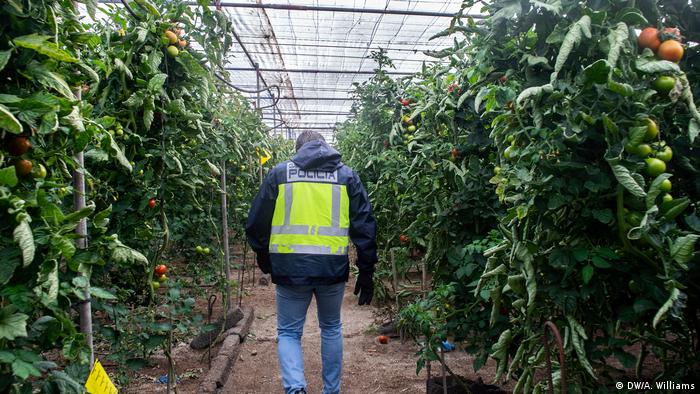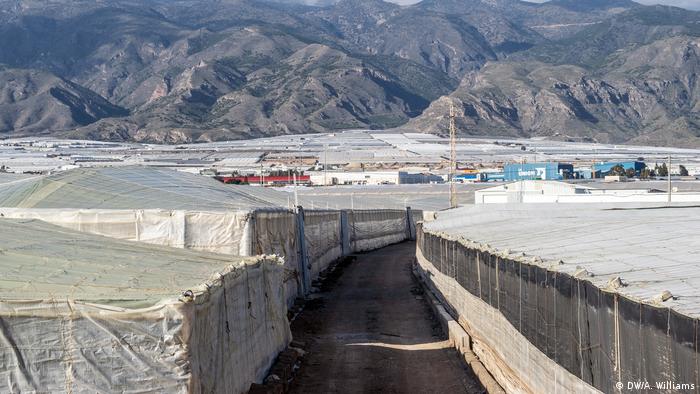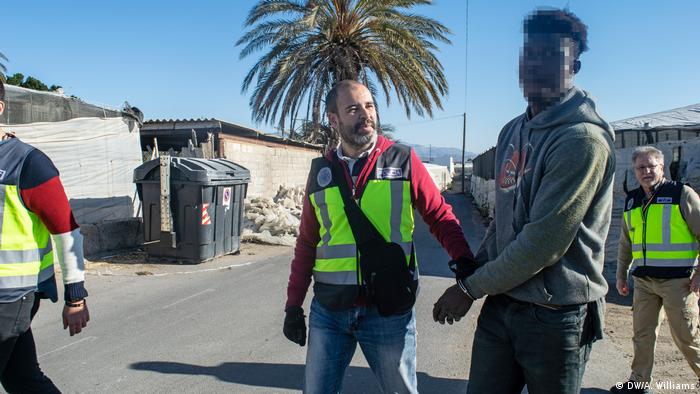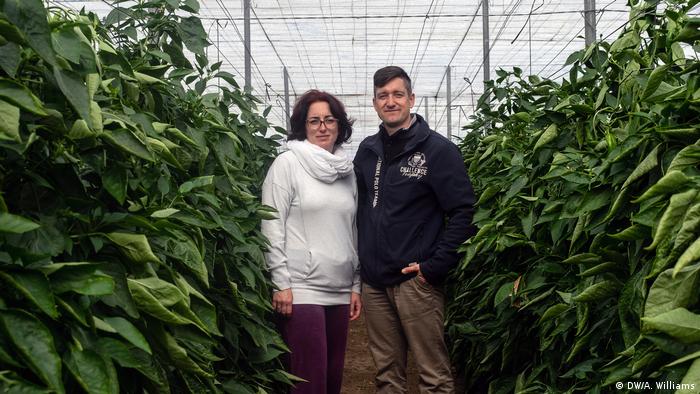From the Sunny Region of Almeria, a large part of what is piling up in the vegetable counters in European supermarkets. The shadow side: In the case of rearing and harvesting are apparently thousands of illegal workers at the plant.

Before sunrise two dozen migrant workers are at a traffic circle in El Ejido, a small town in the South of Andalusia: The men hope that today you will get a Job in one of the numerous greenhouses in the area. “I’m already five days in a row here, and no farmer has shown,” said Abderrazak. It was very difficult to get a job, the 47-year-old Moroccan. “We wait here every day from six to nine, and then we go again.”
Next to him Lie Jallow has been waiting for: “I’ve never worked on a field,” says the Ex-police officer from Gambia, “and I didn’t think I would do that again.”
The province of Almeria, in El Ejido is located, annually produces more than 31,000 hectares of greenhouse area is about 3.5 million tonnes of fruit and vegetables. Because of the many, with Plan-covered greenhouses, the area is also called the “sea of plastic”. What grows here, produced by small-scale farmers, as well as from multi-national corporations, lands mostly in supermarkets in Germany, the UK and other European countries.

Greenhouses in Almeria: “sea of plastic”:
For African migrants in the South of Spain is one of the gateways to Europe. According to the authorities, more than 400 ships from Africa landed in the past year alone on the Mediterranean coast of Almeria. On Board around 12,000 migrants came to the more than 100,000 that were already in the Region.
José Garcia Cueva of the Andalusian agricultural workers ‘ Union SOC has not found SATELLITE that the day laborers from Africa are often in the position to demand better working conditions. “The Problem is that Spanish laws are not respected on the field,” Garcia Cueva. “It’s hard to change that, because employers are accustomed to breaking the law.” Migrant workers would often work without a contract or social security; they were given mostly between 32 and 40 euros per day instead of the minimum wage of 55 euros, says the unionist. “And many are exposed to in the greenhouses environmental toxins.”

Day laborers in El Ejido: Waiting for work at the roundabout
“Two weeks ago, a Moroccan worker died in the state of respiratory arrest. Prior to that, he had a number of symptoms like vomiting,” says Garcia Cueva. Now going to investigate whether his death was caused by pesticides. “He was young and had no health problems.”
Slums and greenhouses
Ismail Ayaman lives in one of the many “Chabolas”, the Slums of Almeria. The 28-year-old Moroccan is in the door of his Dwelling, and look upon what remained of the neighboring huts left. In February, a fire triggered by a gas cylinder had destroyed parts of the district. More than 120 slum dwellers are now homeless.
How many of the day labourers, who live here, also has a built Ayaman his hut out of wood and scraps of old plastic tarps, with which the nearby greenhouses are covered. In most of the cabins have no running water; energy for light and heat comes from gas cylinders or illegally tapped power lines.

Migrant Ayaman: “We have no other option”
“This is very dangerous. Most of the men smoke, and the power cable hang loose; this can cause fires,” says Ayaman. “But we have no other way; without these power lines, we are not able to cook, and at night we have no light”. The “Chabolas” are also a testimony to the failed dreams of many migrants.
“We suffer for nothing,” says Driss El Mansouri, who is also from Morocco. “The bosses always want more money, and you are dealing with the Weak who have no voice, and you will pay worse.”
“I came here because I thought that life in Spain would be better; but in reality, life here is worth nothing,” says his neighbor, Salah Akili. “I live here alone, without a wife and children. I stayed for ten years, an Illegal, because my Boss gave me a contract of employment. The whole time I could not see back to Morocco, my family.”
Investigation against Illegal
According to estimates by the authorities, 30 percent of the migrant workers in Almeria, have no documents. In order to reduce this number, is the “Unidad Central de Redes de Inmigracion Ilegal y Falsedades Documentales”. The UCRIF is a special unit of the police, and determined against farmers who employ illegal workers. In raids horticulture of the area to be searched time and time again for illegal workers to track down.
“Tell me the truth, okay? You’re not,” says José Luiz Cerdan to a suspected illegal workers. The UCRIF-COP stops in the middle of a Tomato plantation the welded-in card in the Hand, the him, the farmhand had given.

RAID in horticulture: “You are!”
His colleague brings the man in handcuffs to a van. “He was arrested because he worked with the papers of another,” says UCRIF-chief Perez Reche. “Very often, migrants have the necessary papers and permits, lend or rent your papers to others, so that the can also work.” Also in Spain, is a punishable offence. If you are caught, come before the court. Farmers have to pay up to 6000 Euro fine for each illegal employee, to say the UCRIF officials.
Farmers in the predicament
Lidia Martinez Walbrecht and her husband, Tobias Evil have leased a 1.5-acre piece of Land and breed on bell peppers and cucumbers. The two employ three workers from Africa and Eastern Europe. They say that competition from Turkey and Morocco, together with rising operating costs, would force the Spanish farmers to look for ways to Save money.
“Last year, we made a profit of 25,000 euros; this year it will be even worse,” says Martinez Walbrecht. You are assured that you pay their workers fair wages, and submit a payroll. “In December, the price for a Kilo declined cucumbers eight cents.” A kilo price of 65 cents would be necessary in order to work cost-covering. This is very hard, and many farmers must abandon their fields,” she adds.

Vegetable farmers Martinez Walbrecht and Evil: “Eight cents per Kilo of cucumbers”
Her husband who used to work as an aircraft mechanic, worked for the German air force, says that the tense economic situation forces the farmers to violate the laws. “They don’t pay well, they give you no work contracts, do not pay social security contributions,” says Evil. In this way, a vegetable farmer could save up to 20,000 euros per year.